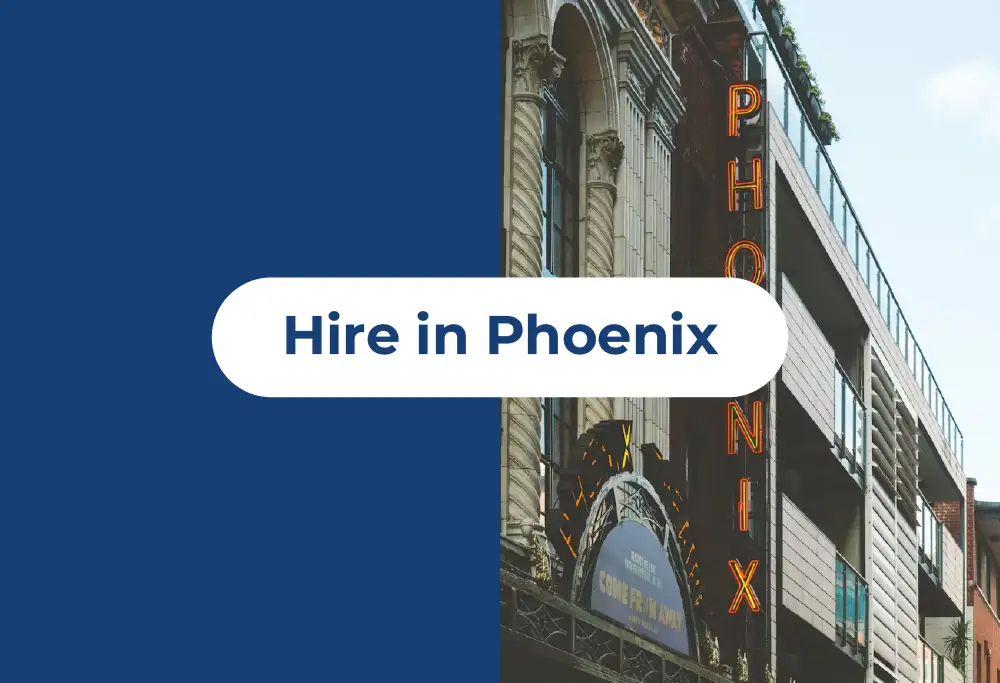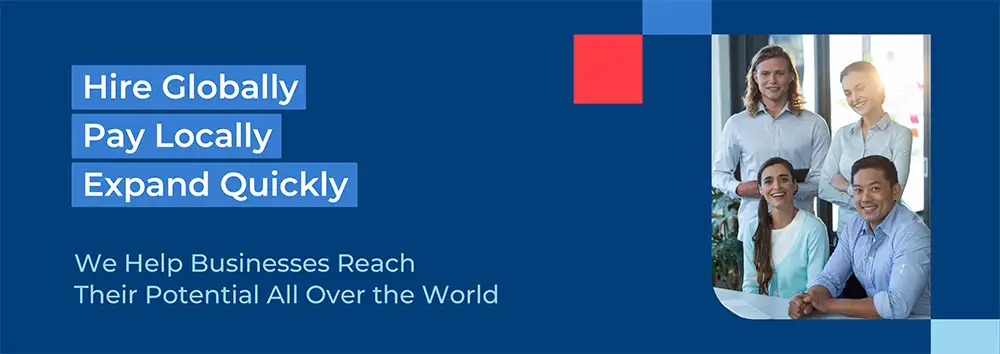Phoenix, the capital of Arizona, has emerged as one of the fastest-growing metropolitan areas in the United States. Known for its booming population, thriving business environment, and role as a hub for technology, manufacturing, and logistics, Phoenix has become an increasingly important location for companies seeking to expand in 2025.
With its affordable cost of living compared to many coastal hubs, access to international markets through its proximity to Mexico, and a highly diverse labor force, Phoenix represents one of the most strategic cities in the U.S. for hiring.
The city is home to leading universities, growing startup ecosystems, and several Fortune 500 companies, making it a top choice for employers across industries.
This guide provides everything you need to know about hiring in Phoenix, from compliance and tax obligations to recruitment strategies and employee benefits.
How to Hire in Phoenix Easily in 2025
Employers seeking to hire in Phoenix have two main options:
- Establishing a U.S. entity in Arizona, which involves registering with state and federal authorities, setting up payroll, and managing compliance internally.
- Partnering with an Employer of Record (EOR), which allows companies to hire employees in Phoenix without creating a local entity. The EOR manages HR, payroll, benefits, and compliance, while the employer directs the employee’s daily work.
To hire successfully in Phoenix, companies should:
- Register for employer taxes with both the IRS and Arizona authorities.
- Draft compliant employment agreements and policies.
- Follow both U.S. labor laws and Arizona-specific employment regulations.
- Provide competitive benefits that align with Phoenix’s growing job market.
- Leverage the city’s universities, job boards, and professional associations to attract candidates.
Why Hire in Phoenix? The Benefits of Hiring in Phoenix
Strategic Location
Phoenix is strategically located in the southwestern United States, just hours from the U.S.–Mexico border. This makes it a critical hub for international trade and logistics, particularly in manufacturing and supply chain industries. Phoenix Sky Harbor International Airport connects the city to major domestic and global markets, further enhancing its position.
Expanding and Diverse Workforce
Phoenix has one of the fastest-growing populations in the United States, drawing people from across the country. This rapid growth has created a diverse and youthful workforce. Institutions such as Arizona State University (ASU), one of the largest universities in the country, provide a steady supply of graduates in engineering, business, IT, and healthcare.
Economic Diversity
While Phoenix has historically been associated with construction and real estate, its economy has diversified significantly. Today, key industries include technology, aerospace, renewable energy, manufacturing, financial services, and healthcare. This diversity makes the city attractive for employers across multiple sectors.
Lower Costs of Doing Business
Compared to cities like San Francisco, Los Angeles, or Seattle, Phoenix offers significantly lower costs for office space, utilities, and living expenses. This allows companies to offer attractive compensation packages while maintaining operational efficiency.
Legal Requirements for Hiring Employees in Phoenix
Employers in Phoenix must comply with both federal labor laws and Arizona state-specific regulations.
Employment Contracts
Arizona follows the “at-will” employment principle, allowing either the employer or the employee to end the employment relationship at any time, provided it does not violate anti-discrimination or labor laws. Written contracts are not required but are highly recommended to outline compensation, benefits, and duties.
Working Hours and Overtime
The standard workweek in Phoenix is 40 hours. Under the Fair Labor Standards Act (FLSA), non-exempt employees must receive 1.5 times their hourly rate for hours worked beyond 40 in a week. Arizona does not impose additional overtime rules beyond federal law but requires accurate timekeeping.
Probation Periods
Probationary periods are not mandated by Arizona law but are commonly applied by employers. A 90-day probationary period is typical.
Termination of Employment
Arizona is an at-will state, meaning employers can terminate employees without cause, provided the dismissal is not discriminatory or retaliatory. Severance pay is not legally required but may be included in company policies or contracts. Employers are encouraged to document performance-related issues to reduce the risk of disputes.
Taxation and Social Security Contributions in Phoenix
Employers hiring in Phoenix must meet federal tax requirements and Arizona state-specific obligations.
1. Individual Income Tax (IIT)
Arizona levies a flat state income tax rate of 2.5% (2025), one of the lowest in the country. Employees must also pay federal income tax, which ranges from 10% to 37%, depending on income. Employers are responsible for withholding both.
2. Employer Contributions to Social Insurance
Employers in Phoenix must contribute to several mandatory programs:
- Social Security: 6.2% of employee wages (matched by employees).
- Medicare: 1.45% of wages (matched by employees).
- Federal Unemployment Tax (FUTA): Generally 0.6% of the first $7,000 in wages.
- Arizona State Unemployment Insurance (SUI): Employer rates vary based on industry and claims history.
3. Contribution Bases
Social Security contributions are capped at the annual federal wage base (about $168,600 in 2025). Medicare has no cap, though employees earning over $200,000 annually must pay an additional 0.9% surtax.
Work Permits and Other Requirements for Hiring Foreign Workers in Phoenix
Phoenix’s position near the U.S.–Mexico border and its growing tech and healthcare sectors attract many foreign professionals. Employers hiring international talent must follow immigration laws.
- Visa Sponsorship: Employers frequently sponsor H-1B visas (specialty occupations), L-1 visas (intra-company transfers), and O-1 visas (extraordinary ability). Sponsorship requires demonstrating that the role cannot be filled locally.
- Labor Condition Application (LCA): For certain visas, employers must file an LCA with the Department of Labor.
- E-Verify: Arizona law requires all employers to use E-Verify to confirm the work eligibility of new hires.
- Background and Health Checks: Certain visas require background verification and medical screenings.
Current Trends and Top Recruitment Strategies in Phoenix
Phoenix’s labor market is evolving rapidly, with significant demand in technology, renewable energy, and healthcare. Companies hiring in 2025 should consider these strategies:
- University Collaborations: Arizona State University is one of the largest sources of graduates in the U.S. Employers can partner with ASU and other local institutions to recruit top talent.
- Technology and Renewable Energy Focus: Phoenix is becoming a hub for solar energy and clean technologies. Employers in these sectors should highlight sustainability and career growth.
- Healthcare and Life Sciences Recruitment: With a rapidly growing population, healthcare professionals are in high demand. Employers should emphasize job security and advancement.
- Diversity and Inclusion: Phoenix has a diverse workforce, including a large Hispanic population. Employers who prioritize inclusive hiring practices will attract stronger candidates.
- Hybrid and Remote Work: Flexible work models are increasingly valued in Phoenix, particularly in tech and finance.
Hiring Skilled Workers vs. Entry-Level Talent in Phoenix
Hiring Skilled Workers
Experienced professionals in Phoenix, especially in tech, healthcare, and renewable energy, expect comprehensive benefits, training opportunities, and career development. Employers should emphasize innovation and long-term stability.
Hiring Entry-Level Talent
Phoenix’s universities and community colleges provide a steady flow of graduates each year. To attract younger workers, companies should focus on mentorship, structured training, and internships. Offering career pathways is essential for retention.
Competitive Benefits in Phoenix
Beyond compensation, benefits packages are a critical factor in attracting employees in Phoenix. Common offerings include:
- Health, dental, and vision insurance
- 401(k) retirement savings with employer contributions
- Paid vacation, sick leave, and parental leave
- Tuition reimbursement and education benefits
- Professional development and training programs
- Employee wellness initiatives
- Hybrid or remote work opportunities
Hiring Solutions for Foreign Companies in Phoenix
International companies can hire in Phoenix through three primary models:
Independent Contractors: Flexible but risky if misclassified under federal or Arizona law. Misclassification can lead to penalties.
Establishing a U.S. Entity: Provides full control but requires significant investment, incorporation, and compliance with state and federal employment laws.
Employer of Record (EOR): The most efficient solution for foreign businesses. An EOR manages payroll, HR, contracts, and compliance while the company directs employee responsibilities. This enables fast and compliant entry into Phoenix’s labor market.
Trust INS Global to Hire in Phoenix Today
Phoenix has become one of the most attractive hiring destinations in the United States in 2025. With its fast-growing population, affordable business costs, proximity to international markets, and diverse economy, it offers unmatched opportunities for companies across industries.
At the same time, navigating Arizona’s labor laws, tax obligations, and immigration requirements can be complex for new employers. That’s where INS Global can help.
Our Employer of Record (EOR) services in Phoenix streamline hiring, ensuring compliance while allowing companies to focus on business growth and talent development.



SHARE